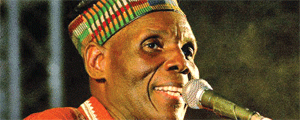
JOHANNESBURG — He might have some 60 albums under his belt and numerous awards to his name, but iconic Zimbabwean musician Oliver Mtukudzi has no plans to slow down.
Report by CNN “Retiring from what?” he asks purposefully when asked if he’d consider a break from music.
“This is me,” explains 60-year-old Mtukudzi moments before he hits the stage at the Market Theatre in downtown Johannesburg, South Africa.
“I’m doing me; I’m not doing a career. This is who I am; I can’t retire really from myself.”
It is, then no surprise that award-winning Mtukudzi, who is affectionately called “Tuku” by his fans, decided to mark his birthday last September with the release of yet another album.
Called Sarawoga, which means “left alone” in Shona, the recording comes after a long period of grief for the soft-spoken artiste following the death of his only son Sam in 2010.
“I’m still learning to live with it,” says Mtukudzi, who had written and rehearsed many of the album’s songs with Sam, who was a highly-talented multi-instrumentalist himself who pursued his own music career, but would also often perform with his father.
“I’ve only released my first offering this year and for the past two years I didn’t even think about my music really,” he said.
- Chamisa under fire over US$120K donation
- Mavhunga puts DeMbare into Chibuku quarterfinals
- Pension funds bet on Cabora Bassa oilfields
- Councils defy govt fire tender directive
Keep Reading
“I was just thinking of him and trying to recover, even though music was my therapy. I think I’ve performed more shows since 2010 up to today than ever before because that’s the only therapy I’ve got.”
Born into a musical family in 1952, Mtukudzi has been successfully performing for nearly four decades throughout Africa as well as in the United Kingdom, the United States and Canada.
His foot-stomping music has been described as a mixture of Zimbabwean pop-style “jit” and South African township pop.
Through his distinct sound and inspiring lyrics, he has documented the joy and pain of his countrymen who fought for freedom under colonial rule and died for democracy after Zimbabwe’s independence in 1980.
“Where I come from you don’t get to sing a song if you have nothing to say,” said the musician, who grew up in Highfield, a ghetto neighbourhood in the capital of Harare.
“So every song has something to do with that man in the street, he must be able to use it in his life.”
As a young boy, Mtukudzi joined choirs to improve his singing talent and taught himself how to play a three-string guitar. He soon started writing and recording songs and after an illustrious career, he is today one of Zimbabwe’s best-known musicians.
More than just an entertainer, Mtukudzi is committed to addressing everyday social challenges, using his music as a vehicle to speak about the issues he is passionate about.
In 2003, he founded an art centre in Norton near Harare and last year he became a Unicef Goodwill Ambassador for Eastern and Southern Africa, focusing on youth development and HIV and Aids.











